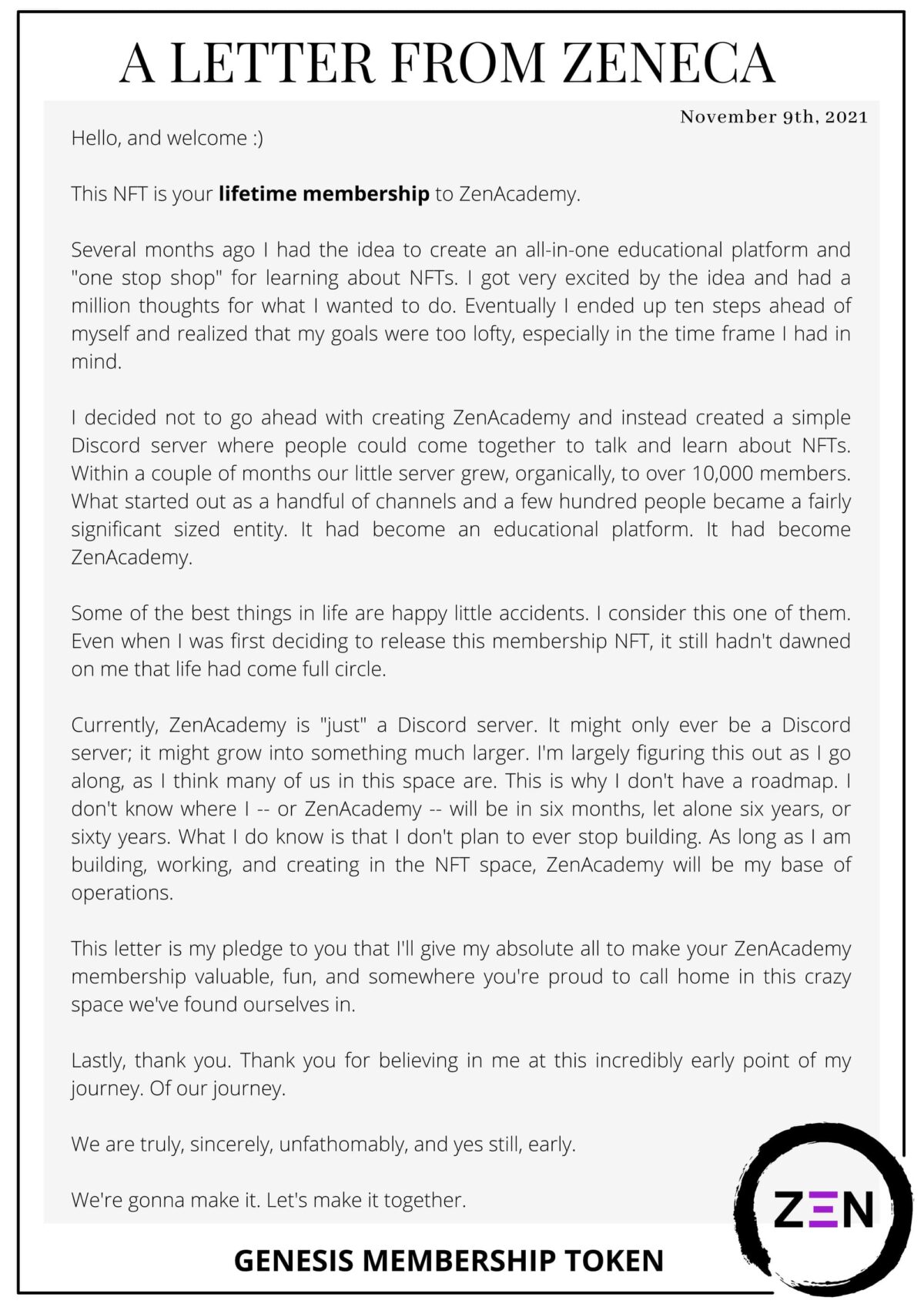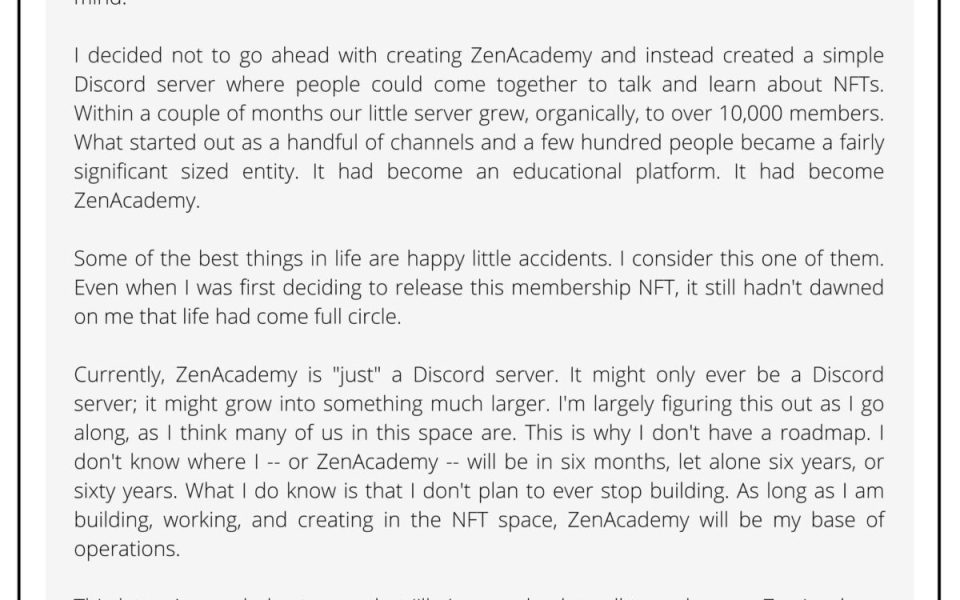How Zeneca Built a Community by Doubling Down on Education
Everyone remembers the person who introduced them to Web3.
Web3 builder and advisor Zeneca has filled that role for many newcomers to the space, offering a wide range of educational offerings via his flagship ZenAcademy and more intimate 333 Club communities.
Today (Aug. 30), Zeneca took the next step in developing his ecosystem through the Denizens of ZenAcademy drop. After resisting the temptation of releasing a PFP project for nearly two years, he finally decided to take the plunge through a non-dilutive token swap for existing community members.
“What changed for me was now we have a community; we already have that foundation,” he explains. “We have people who are excited about this PFP and want to represent the community on social media, Discord, and build the brand with us. Through that lens, it started to make sense to strengthen and enhance our existing community rather than use it to fund and build a community.”
In a candid nft now podcast interview, Zeneca dives into his Denizens project, offers valuable advice for content creators and community builders, and gives his unvarnished opinion on the current market.
Matt Medved: Let’s hear the backstory. How did you get into Web3?
Zeneca: I was a professional poker player for 15 years. That’s all I did. I went from high school to poker. And then I dabbled in crypto in 2017, like many people, but it was really like, I just had my money on exchanges. I was trading, and it’s fun when the number goes up, and then [the market] crashed. And I was like, ah, that was a fun experiment, and let’s go back to real life.
But in early 2021, obviously, the bull market was taking off again. And I came back in, and some friends told me about crypto and DeFi. And I was like, there’s stuff now you can actually do stuff on Ethereum, there’s applications, and it really blew my mind. I saw it and asked, “Why is everyone in the world not talking about this?” Then I just fell down the rabbit hole, and I’m honestly still falling and just got obsessed.

You launched the Zen Academy in November 2021. For those who may not be familiar, what is the Zen Academy, and what was your vision behind starting it?
I was doing a lot of trading in 2021. But then, halfway through June, I started creating content. Newsletter writing, long Twitter threads, and it just kind of all blew up. And I think a huge part of that obviously was the bull market— right place, right time. And very few other people were creating NFT content.
Then it all started like blowing up, and I realized, ‘Hey, I love this. I enjoy creating content. I like writing. I like educating. It’s fulfilling. It’s rewarding. Wow, can I do this full-time? I don’t want to be trading anymore. I don’t want to go back to Poker. And then you think of the traditional models for monetizing as a content creator and writer; there’s Patreon, sponsors, and affiliate links.’
And I was like, You know what? I’m all in on NFTs. I will sell an NFT that acts like a membership token, and that will be it. We’ll have royalties forever, and everyone will be happy, and it’ll work. Obviously, that didn’t quite pan out that way, but it was an experiment, and I said, “You know what? This is what I want to do.”
[My token] was relatively affordable at the time. A few thousand people minted, and we’ve spent the last two years figuring it out, creating courses, putting out newsletters, and just generally trying to educate people. That’s the entire thesis of our community. I mean, it’s there in the name “Academy.” It’s all about creating educational content and helping.
Let’s dive into Denizens. This is your first PFP project. What is it, and why now?
“Why PFPs?” is a good question everyone should answer before launching a collection. Even in 2021, let alone now.
When I first launched Zen Academy, I was extremely intentional about not doing PFPs. Because everyone was doing it at the time. This was the peak bull in November 2021. At that time, I felt there were way too many PFPs. We don’t need another PFP project. Obviously, we’ve had a billion more come out since then and now.
What changed for me was now we have a community; we already have that foundation. We have people who are excited about this PFP and who want to represent the community on social media, Discord, and build out the brand with us. Through that lens, it started to make sense to strengthen and enhance our existing community rather than use it to fund and build a community. We’re not selling it. We’re not making a public sale. We’re not making any money again, perhaps to our detriment. Burn your previous token and get a PFP. That’s the mechanism; it’s non-dilutive. It’s landed well with our community.
“’Why PFPs?’ is a good question everyone should answer before launching a collection. Even in 2021, let alone now.”
zeneca
How will the Denizens play into the overall ecosystem of Zen Academy, 333, etc.?
Yeah, so basically, we are a membership community with three tiers. So, I would say 333 is the top premium maximum 333 tokens. Denizens are like the middle tier 10,000 PFPs. They’re like members of Zen Academy: they get the same utility that they always have and will in the future, which is, you know, access to courses. I create discounts for things, newsletters, free educational materials that the general public might otherwise pay for, and things like that. That is our way of trying to deliver tangible value and utility.
Instead of going and paying $200 or $300 for a 15-hour video course, you can buy our token and get a course for free and things like that. And then we have the more accessible inclusive tier. We have the student IDs, which are the Soul Bound Unlimited supply of NFTs that anyone can go to a website now and mint. That gets you into our ecosystem. It’ll get you into a Discord, and you know, you can join our mailing list, and you’re still very much part of the family, and you don’t have to spend, you know, a couple of ETH for a 333 pass.
Many people compare these markets to a casino; you were a poker player before entering Web3. I’m curious— how has that experience given you insight into navigating this space?
It really is like a casino. Most people in the space are gambling one way or another. I see people all the time who clearly have gambling problems. Maybe they don’t think of it as that because it’s crypto or NFTs and not the casino or lottery. But my background has prepared me tremendously for this space because I’ve spent 15 years making and losing lots of money in short periods of time.
Mentally, I’ve found ways to deal with those swings and not take them too seriously. As well as put together strategies to not do silly things, not succumb to addiction, not chase my losses, and all that kind of stuff. For people who might come from a more traditional background or even an 18-year-old who doesn’t have that much life experience, it’s so easy to get on the wrong path in this space. I genuinely don’t encourage too many people to enter and splash around with money.
“The most important thing to me is survival, not losing all your money, leaving the space, totally giving up, and staying mentally sane.”
zeneca
What tips do you have for Web3 content creators?
It’s a new era. The world is changing around us, and it’s keep up or get left behind to a certain extent. There are two distinct schools of thought. You have the people who treat growing an audience and content creation as a skill with tools, strategies, and tactics, like how to structure your threads, write a hook to get people to read the next one, bookmark, retweet, and go to your newsletter. In the other camp, you have the more genuine and organic creators where you have to find your voice and deliver value. Some people just want to hear raw, honest truth from someone with experience founding a project.
Regardless of your path, being genuine and finding your voice will be increasingly important because the space has grown, and there are ten times as many content creators now, so much of it is just the same stuff rehashed. Are you really standing out? I tried doing it the first way, signed up for courses, and created a systemized approach, but it wasn’t for me. So, I’m returning to what I’ve always done, hoping it’ll be more sustainable in the long term. Don’t lose yourself in the process.
What are your thoughts about where we are in the current market cycle? Where are things going, and how will NFTs play a role in the future?
I have no idea where we are in the market cycle. Looking back at four-year cycles and all that stuff, maybe things will turn around in 2024-2025, and that’s when the bull will come. Past performance is no guarantee of the future. It’s like, who knows if it’ll play out that way. The most important thing to me is survival, not losing all your money, leaving the space, totally giving up, and staying mentally sane.
For most people, that’s not trading. That’s not trying to play with fire in this market. Spend some time meeting people, connecting, learning about the technology and what’s coming up. When things seem like they’re taking off again, you can maybe get a little more interested and invested and take advantage of that if that’s your goal.
What else can you tell us about future plans?
Denizen is the big one coming out. The way to get one is, again, it’s only for our existing community, with no public launch. You’ll have to pick up a token on a secondary market. There’ll be a direct one-to-one burn, pick up a chest, burn, and get a Denizen. Then what’s coming in the future is more courses and more content. I’m working on a personal branding course. I think that that’s something a lot of people want. We’re in the creator economy world, and how to build a personal brand can be valuable.
This interview transcript has been edited for concision and clarity.
Watch or listen to our podcast episode with Zeneca for the full and uncut interview.
The post How Zeneca Built a Community by Doubling Down on Education appeared first on nft now.



 (@Zeneca)
(@Zeneca) 





 :
:  :
: